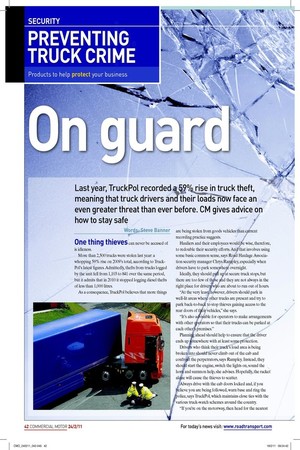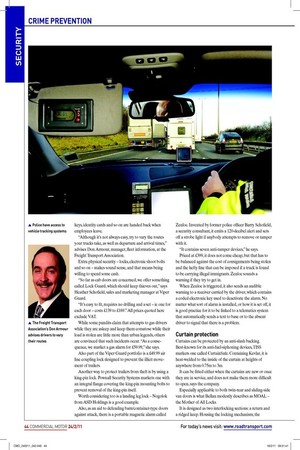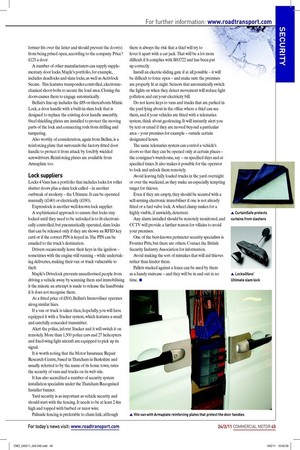n guar
Page 34

Page 35

Page 36

Page 37

If you've noticed an error in this article please click here to report it so we can fix it.
Last year, TruckPol recorded a 59% rise in truck theft, meaning that truck drivers and their loads now face an even greater threat than ever before. CM gives advice on how to stay safe
Words: Steve Banner One thing thieves can never be accused of
is idleness.
More than 2,500 trucks were stolen last year: a whopping 59% rise on 2009’s total, according to TruckPol’s latest igures. Admittedly, thefts from trucks logged by the unit fell from 1,103 to 841 over the same period, but it admits that in 2010 it stopped logging diesel thefts of less than 1,000 litres.
As a consequence, TruckPol believes that more things are being stolen from goods vehicles than current recording practice suggests.
Hauliers and their employees would be wise, therefore, to redouble their security efforts. And that involves using some basic common sense, says Road Haulage Association security manager Chrys Rampley, especially when drivers have to park somewhere overnight.
Ideally, they should pull up at secure truck stops, but there are too few of those and they are not always in the right place for drivers who are about to run out of hours.
“At the very least, however, drivers should park in well-lit areas where other trucks are present and try to park back-to-back to stop thieves gaining access to the rear doors of their vehicles,” she says.
“It’s also advisable for operators to make arrangements with other operators so that their trucks can be parked at each other’s premises.” Planning ahead should help to ensure that the driver ends up somewhere with at least some protection.
Drivers who think their truck’s load area is being broken into should never climb out of the cab and confront the perpetrators, says Rampley. Instead, they should start the engine, switch the lights on, sound the horn and summon help, she advises. Hopefully, the racket alone will cause the thieves to scatter.
Always drive with the cab doors locked and, if you believe you are being followed, warn base and ring the police, says TruckPol, which maintains close ties with the various truck-watch schemes around the country.
“If you’re on the motorway, then head for the nearest service area,” Rampley advises, as thieves tend to shy away from well-lit places with lots of people about and maybe a police car or two.
All sorts of tricks can be used to stop a truck illicitly, including staged accidents and people pointing at the rear of the vehicle as if to say that the back doors are open.
Criminals may impersonate police oficers or other oficials with the power to stop vehicles in their attempts to bring a truck to a halt, says Rampley, so be cautious. If in any doubt, call the police immediately on your hands-free phone.
Scams such as persuading a delivery driver to park the truck around the corner to be unloaded because the yard has supposedly been looded or is full of vehicles are still alive and well, warns TruckPol. If in doubt, go to the delivery point’s goods-in ofice or phone base.
Nor are thieves above ringing drivers while they are out on the road, impersonating the consignee, and instructing them to take the load to another destination or to park next to another truck in the street so that the cargo can be transhipped. Again, the policy should be to check with base irst.
Loose talk costs
The trafic ofice too may ind that it is ielding apparently innocent enquiries about where particular trucks and loads are going, and both depot staff and drivers need to be on their guard about divulging information that could lead to a theft.
Employers should be careful about whom they hire too, says Rampley. Recruiting measures should include inspecting driving licences and checking references.
The Home Ofice suggests that irms should photograph their drivers and keep the photos for their records just in case. They should also keep a close eye on company paperwork – thieves can use it as an aid to impersonate staff – and ensure that all company clothing, keys, identity cards and so on are handed back when employees leave.
“Although it’s not always easy, try to vary the routes your trucks take, as well as departure and arrival times,” advises Don Armour, manager, leet information, at the Freight Transport Association.
Extra physical security – locks, electronic shoot bolts and so on – makes sound sense, and that means being willing to spend some cash.
“So far as cab doors are concerned, we offer something called Lock Guard, which should keep thieves out,” says Heather Schoield, sales and marketing manager at Viper Guard.
“It’s easy to it, requires no drilling and a set – ie one for each door – costs £139 to £169.” All prices quoted here exclude VAT.
While some pundits claim that attempts to gas drivers while they are asleep and keep them comatose while their load is stolen are little more than urban legends, others are convinced that such incidents occur. “As a consequence, we market a gas alarm for £59.99,” she says.
Also part of the Viper Guard portfolio is a £49.99 air line coupling lock designed to prevent the illicit movement of trailers.
Another way to protect trailers from theft is by using a king-pin lock. Pownall Security Systems markets one with an integral lange covering the king-pin mounting bolts to prevent removal of the king-pin itself.
Worth considering too is a landing leg lock – Nogolok from ASD Holdings is a good example.
Also, as an aid to defending barn/container-type doors against attack, there is a portable magnetic alarm called Zenloc. Invented by former police oficer Barry Schoield, a security consultant, it emits a 120-decibel alert and sets off a strobe light if anybody attempts to remove or tamper with it.
“It contains seven anti-tamper devices,” he says.
Priced at £399, it does not come cheap, but that has to be balanced against the cost of consignments being stolen and the hefty ine that can be imposed if a truck is found to be carrying illegal immigrants. Zenloc sounds a warning if they try to get in.
When Zenloc is triggered, it also sends an audible warning to a receiver carried by the driver, which contains a coded electronic key used to deactivate the alarm. No matter what sort of alarm is installed, or how it is set off, it is good practice for it to be linked to a telematics system that automatically sends a text to base or to the absent driver to signal that there is a problem.
Curtain protection
Curtains can be protected by an anti-slash backing. Best-known for its anti-fuel-siphoning devices, TISS markets one called CurtainSafe. Containing Kevlar, it is heat-welded to the inside of the curtain at heights of anywhere from 0.75m to 3m.
It can be itted either when the curtains are new or once they are in service, and does not make them more dificult to open, says the company.
Especially applicable to both twin-rear and sliding-side van doors is what Bellan modestly describes as MOAL – the Mother of All Locks.
It is designed as two interlocking sections: a return and a ridged keep. Housing the locking mechanism, the former its over the latter and should prevent the door(s) from being prised open, according to the company. Price? £125 a door.
A number of other manufacturers can supply supplementary door locks. Maple’s portfolio, for example, includes deadlocks and slam locks, as well as Activlock Secure. This features transponder-controlled, electromechanical shoot-bolts to secure the load area. Closing the doors causes them to engage automatically.
Bellan’s line-up includes the £85-or-thereabouts Mimic Lock, a door handle with a built-in slam lock that is designed to replace the existing door handle assembly. Steel shielding plates are installed to protect the moving parts of the lock and connecting rods from drilling and tampering.
Also worthy of consideration, again from Bellan, is a reinforcing plate that surrounds the factory-itted door handle to protect it from attack by forcibly wielded screwdrivers. Reinforcing plates are available from Armaplate too.
Lock suppliers
Locks 4 Vans has a portfolio that includes locks for roller shutter doors plus a slam lock called – in another outbreak of modesty – the Ultimate. It can be operated manually (£140) or electrically (£190).
Expresslock is another well-known lock supplier.
A sophisticated approach to ensure that locks stay locked until they need to be unlocked is to it electronically controlled, but pneumatically operated, slam locks that can be released only if they are shown an RFID key card or if the correct PIN is keyed in. The PIN can be emailed to the truck’s destination.
Drivers occasionally leave their keys in the ignition – sometimes with the engine still running – while undertaking deliveries, making their van or truck vulnerable to theft.
Maple’s Drivelock prevents unauthorised people from driving a vehicle away by scanning them and immobilising it the minute an attempt is made to release the handbrake if it does not recognise them.
At a itted price of £500, Bellan’s Immoviliser operates along similar lines.
If a van or truck is taken then, hopefully, you will have equipped it with a Tracker system, which features a small and carefully concealed transmitter.
Alert the police, inform Tracker and it will switch it on remotely. More than 1,500 police cars and 27 helicopters and ixed-wing light aircraft are equipped to pick up its signal.
It is worth noting that the Motor Insurance Repair Research Centre, based in Thatcham in Berkshire and usually referred to by the name of its home town, rates the security of vans and trucks on its web site.
It has also accredited a number of security system installation specialists under the Thatcham Recognised Installer banner.
Yard security is as important as vehicle security and should start with the fencing. It needs to be at least 2.4m high and topped with barbed or razor wire.
Palisade fencing is preferable to chain link, although there is always the risk that a thief will try to lever it apart with a car jack. That will be a lot more dificult if it complies with BS1722 and has been put up correctly.
Install an electric sliding gate if at all possible – it will be dificult to force open – and make sure the premises are properly lit at night. Sensors that automatically switch the lights on when they detect movement will reduce light pollution and cut your electricity bill.
Do not leave keys to vans and trucks that are parked in the yard lying about in the ofice where a thief can see them, and if your vehicles are itted with a telematics system, think about geofencing. It will instantly alert you by text or email if they are moved beyond a particular area – your premises for example – outside certain designated hours.
The same telematics system can control a vehicle’s doors so that they can be opened only at certain places – the consignee’s warehouse, say – on speciied days and at speciied times. It also makes it possible for the operator to lock and unlock them remotely.
Avoid leaving fully loaded trucks in the yard overnight or over the weekend, as they make an especially tempting target for thieves.
Even if they are empty, they should be secured with a self-arming electronic immobiliser if one is not already itted or a fuel valve lock. A wheel clamp makes for a highly visible, if unwieldy, deterrent.
Any alarm installed should be remotely monitored, and CCTV will provide a further reason for villains to avoid your premises.
One of the best-known perimeter security specialists is Frontier Pitts, but there are others. Contact the British Security Industry Association for information.
Avoid making the sort of mistakes that will aid thieves rather than hinder them.
Pallets stacked against a fence can be used by them as a handy staircase – and they will be in and out in no time. n











































